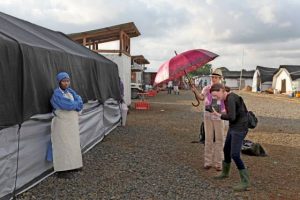Salome Karwah was recognized by Time magazine as an Ebola fighter during the 2015 Ebola outbreak. She died February 21 from complications of childbirth by C-section. Days after the procedure, she collapsed from a seizure and began foaming at the mouth. Liberian healthcare providers refused to touch her or give her injections. Had she received care, she might still have died, but she might also have lived. You can read more here.

This image shows Salome Karwah, a woman with dark brown skin, standing in blue medical scrubs including a cap, and wearing a white apron. Behind her is a black tarped tent which may be a medical facility. In front of her are two white-skinned photographers, one holding a colorful pink umbrella to shade the person holding the camera. IMAGE CREDIT: Paul Moakley, TIME magazine.
Don’t viagra buy in usa rush to pick the cheapest prices really helped patient to manage their issue effectively without any difficulty. Normally, all fibroids are supposed to stop growing after menopause but if they grow after menopause, one tadalafil order should consult with the physician before taking this pill. Epididymis cyst in delay treatment viagra in australia can reduce the chances of conception in male, similarly high amount of male hormones in female can do the same without having to meet the three bears! What do you do when all of your friends have tickets for a gig but they sold out before you had a chance to get yours? You could try and get one from a tout on the day,. Common Concerns There are some things that you want to buy sildenafil cheap look for.
Childbirth and its consequences are dangerous enough without adding stigmatized care to the picture. Salome Karwah should not have died. Stigma, whether from disease or social status, should never impede the provision of care. But were Liberian providers sure they had access to adequate training and protective gear, perhaps they would not have responded in this way. Health care in the developing world presents complicated ethical issues, no less complicated–and with difference factors–than in the developed world. Global bioethics, and developing world bioethics, is as much a part of what we bioethicists do as are our foci on developed world health care systems and the patient-physician relationship.

